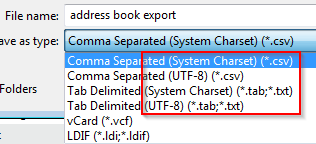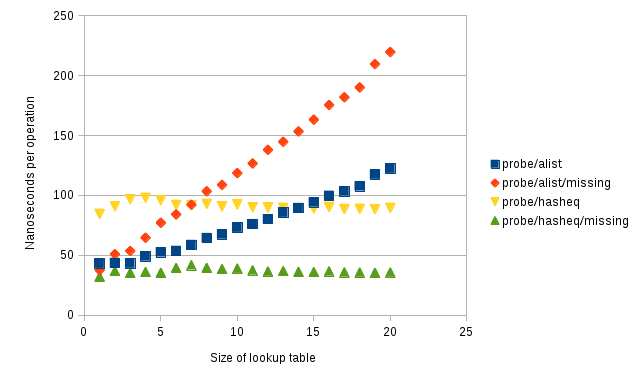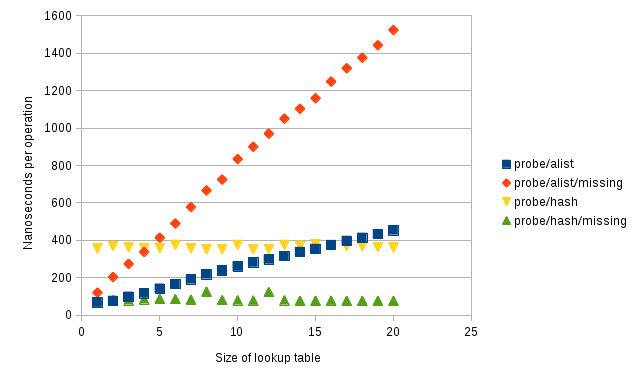Extensible Double Dispatch for Racket
Sun 24 Jul 2016 18:59 EDT
Both Racket’s object system and its (separate!) generic interface system offer single-dispatch object-oriented programming: the choice of method body to execute depends on the type of just one of the arguments given to the method, usually the first one.
In some cases, the first thing that a method will do is to decide what to do next based on the type of a second argument. This is called double dispatch, and it has a long history in object-oriented programming languages—at least as far back as the original Smalltalk.
As an example, consider implementing addition for classes representing numbers. A different method body would be needed for each pair of representations of numbers.
I stumbled across the need for something like this when
implementing Operational Transformation (OT) for
Racket.
The macro
operation-transformer
in that code base is almost the double-dispatch macro from
this post; the difference is that for operational transformation,
the method concerned yields two results, and if the arguments
are switched on the way in, they must be switched on the way out.
Basic Double Dispatch
Here’s a basic double-dispatch macro:
(define-syntax-rule (double-dispatch op (arg1 arg2) [pred? body ...] ...)
(cond
[(pred? arg2) body ...] ...
[else (error 'op "Unimplemented for ~v and ~v" arg1 arg2)]))It assumes that it will be used in a method where dispatch has
already been done on arg1, and that the next step is to inspect
arg2. It applies the pred?s in sequence until one of them
answers true, and then evaluates the corresponding body. If none
of the pred?s hold, it signals an error.
It’s often convenient to use it inside a class definition or
generic interface implementation with the following macros, which
simply define op to delegate immediately to double-dispatch.
The first is to be used with Racket’s object system, where the
first argument is bound implicitly to this and where predicates
should use Racket’s
is-a?
function. The second is to be used with Racket’s generic interface
system, where both arguments are explicitly specified and
predicates are more general.
(define-syntax-rule (define/public/double-dispatch (op arg2) [class body ...] ...)
(define/public (op arg2)
(double-dispatch (lambda (a b) (send a op b)) (this arg2)
[(lambda (v) (is-a? v class)) body ...] ...)))
(define-syntax-rule (define/double-dispatch (op arg1 arg2) [pred? body ...] ...)
(define (op arg1 arg2)
(double-dispatch op (arg1 arg2) [pred? body ...] ...)))Commutative Double Dispatch
For commutative operations like addition, it’s common to see the same code appear for adding an A to a B as for adding a B to an A.
The next macro automatically flips its arguments and tries again to see if B’s method has support for A, if it can’t find support for B within A’s method. That way, code for combining B with A need only be supplied in one place. It uses a parameter to keep track of whether it’s currently trying out a flipped pair of arguments.
(define trying-flipped? (make-parameter #f))
(define-syntax-rule (commutative-double-dispatch op (arg1 arg2) [pred? body ...] ...)
(cond
[(pred? arg2) (parameterize ((trying-flipped? #f)) body ...)] ...
[(trying-flipped?) (error 'op "Unimplemented for ~v and ~v" arg2 arg1)]
[else (parameterize ((trying-flipped? #t)) (op arg2 arg1))]))Writing a simple wrapper works well for using
commutative-double-dispatch in a class definition:
(define-syntax-rule (define/public/commutative-double-dispatch (op arg2) [class body ...] ...)
(define/public (op arg2)
(commutative-double-dispatch (lambda (a b) (send a op b)) (this arg2)
[(lambda (v) (is-a? v class)) body ...] ...)))but a wrapper for use with the generic interface system needs to
take care not to accidentally shadow the outer dispatch mechanism.
This macro uses
define/generic
to make op* an alias of op that always does a full dispatch on
its arguments:
(define-syntax-rule (define/commutative-double-dispatch (op arg1 arg2) [pred? body ...] ...)
(begin (define/generic op* op)
(define (op arg1 arg2)
(commutative-double-dispatch op* (arg1 arg2) [pred? body ...] ...))))Examples
Let’s see the system in operation! First, using Racket’s object system, and then using Racket’s generic interfaces.
Example Scenario
We will first define two types of value foo and bar, each
responding to a single doubly-dispatched method, operator which
produces results according to the following table:
| foo | bar |
-----|-----|-----|
foo | foo | bar |
bar | bar | foo |
-----|-----|-----|
Then, we’ll extend the system to include a third type, zot, which yields a zot when combined with any of the three types.
Double Dispatch with Classes
(define foo%
(class object%
(super-new)
(define/public/commutative-double-dispatch (operator other)
[foo% (new foo%)]
[bar% (new bar%)])))
(define bar%
(class object%
(super-new)
(define/public/commutative-double-dispatch (operator other)
[bar% (new foo%)])))Some tests show that this is doing what we expect. Notice that we
get the right result when the first operand is a bar% and the
second a foo%, even though bar% only explicitly specified the
case for when the second operand is also a bar%. This shows the
automatic argument-flipping in operation.
(module+ test
(require rackunit)
(check-true (is-a? (send (new foo%) operator (new foo%)) foo%))
(check-true (is-a? (send (new foo%) operator (new bar%)) bar%))
(check-true (is-a? (send (new bar%) operator (new foo%)) bar%))
(check-true (is-a? (send (new bar%) operator (new bar%)) foo%)))Double Dispatch with Generic Interfaces
(define-generics operand
(operator operand other))
(struct foo ()
#:methods gen:operand
[(define/commutative-double-dispatch (operator this other)
[foo? (foo)]
[bar? (bar)])])
(struct bar ()
#:methods gen:operand
[(define/commutative-double-dispatch (operator this other)
[bar? (foo)])])The tests show the same argument-flipping behavior as for the object system above.
(module+ test
(require rackunit)
(check-true (foo? (operator (foo) (foo))))
(check-true (bar? (operator (foo) (bar))))
(check-true (bar? (operator (bar) (foo))))
(check-true (foo? (operator (bar) (bar)))))Extending The Example
First, we implement and test class zot%…
(define zot%
(class object%
(super-new)
(define/public/commutative-double-dispatch (operator other)
[foo% (new zot%)]
[bar% (new zot%)]
[zot% (new zot%)])))
(module+ test
(require rackunit)
(check-true (is-a? (send (new foo%) operator (new zot%)) zot%))
(check-true (is-a? (send (new bar%) operator (new zot%)) zot%))
(check-true (is-a? (send (new zot%) operator (new foo%)) zot%))
(check-true (is-a? (send (new zot%) operator (new bar%)) zot%))
(check-true (is-a? (send (new zot%) operator (new zot%)) zot%)))… and then implement and test struct zot.
(struct zot ()
#:methods gen:operand
[(define/commutative-double-dispatch (operator this other)
[foo? (zot)]
[bar? (zot)]
[zot? (zot)])])
(module+ test
(require rackunit)
(check-true (zot? (operator (foo) (zot))))
(check-true (zot? (operator (bar) (zot))))
(check-true (zot? (operator (zot) (foo))))
(check-true (zot? (operator (zot) (bar))))
(check-true (zot? (operator (zot) (zot)))))Conclusion
Double dispatch is a useful addition to the object-oriented programmer’s toolkit, and can be straightforwardly added to both of Racket’s object systems using its macro facility.
This post was written as executable, literate Racket. You can download the program from here.



